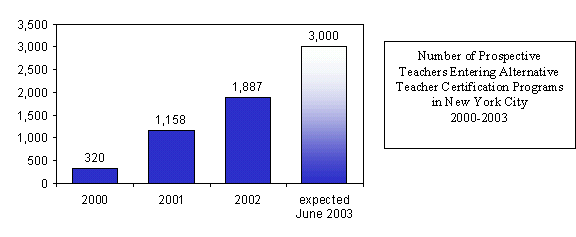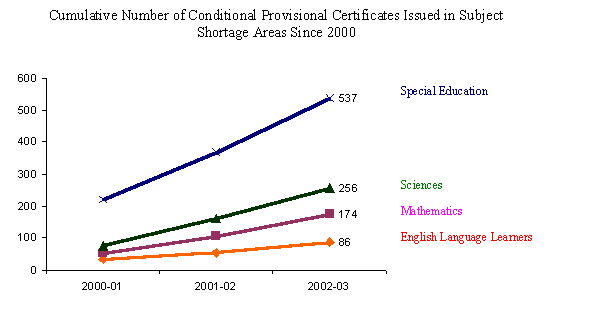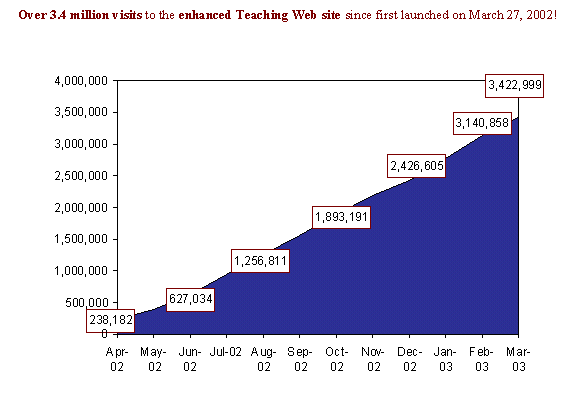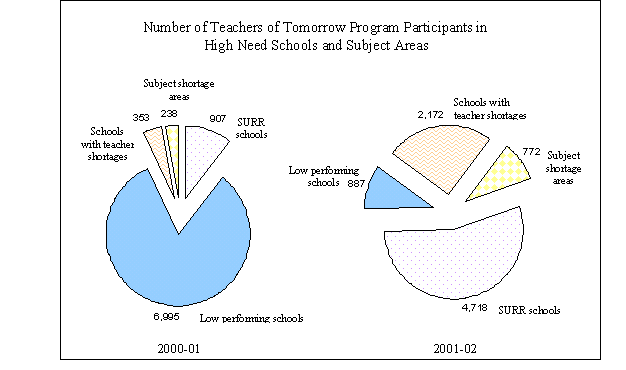Meeting of the Board of Regents | April 2003
|
|
THE STATE EDUCATION DEPARTMENT / THE UNIVERSITY OF THE STATE OF NEW YORK / ALBANY, NY 12234 |
|
TO: |
The Honorable the Members of the Board of Regents |
|
FROM: |
Johanna Duncan-Poitier |
|
COMMITTEE: |
Higher and Professional Education |
|
TITLE OF ITEM: |
Review of Regents Teaching Policy - Five Years of Teaching to Higher Standards: New York�s Commitment |
|
DATE OF SUBMISSION: |
April 23, 2003 |
|
PROPOSED HANDLING: |
Discussion |
|
RATIONALE FOR ITEM: |
Review progress on implementation of the Regents policy on teaching, Teaching to Higher Standards: New York�s Commitment |
|
STRATEGIC GOAL: |
Goals 1, 2, 3, and 4 |
|
AUTHORIZATION(S): |
SUMMARY:
The Board of Regents adopted its new teaching policy, Teaching to Higher Standards: New York�s Commitment, five years ago. Since that time, substantial progress has been made to implement that policy.
Regents Task Force on Teaching appointed, 1996. After adopting the State Learning Standards for students in 1996, the Board of Regents began their important work to ensure a sufficient number of qualified and committed teachers for each school. Former Chancellor Carl Hayden appointed a Regents Task Force on Teaching, charging this group with developing recommendations for achieving this goal. The Task Force was convened under the leadership of Regent Diane O�Neill McGivern and Regent Robert M. Johnson.
Extensive consultation. Acknowledging the complexity of their work and the need to collaborate with many diverse stakeholders, from 1996-1998, the Task Force conferred extensively with a wide variety of constituents and public officials, consulted with national experts, surveyed the literature and experiences of other states, and conducted eight public forums around New York State.
Task Force recommendations. After studying the condition of education in the State, the Task Force identified four critical gaps related to teaching:
GAP 1: New York does not attract and keep enough of the best teachers where they are needed most.
GAP 2: Not enough teachers leave college prepared to ensure that students reach higher standards.
GAP 3: Not enough teachers maintain the knowledge and skills for teaching to high standards throughout their careers.
GAP 4: Many school environments actively work against effective teaching and learning.
In their policy document, Teaching to Higher Standards: New York�s Commitment, the Task Force proposed a series of recommendations to address the four key gaps. In July 1998, the Board of Regents unanimously approved the recommendations of the Task Force.
The attached report highlights much of the work that has been done to implement the Regents policy and identifies follow-up actions and next steps to continue the progress in fulfilling the Regents goal of assuring that all schools have sufficient number of qualified and committed teachers. Select accomplishments include:
Enhanced Teacher Preparation
- The Regents identified the knowledge and skills necessary for effective teaching in 1999.
- A teacher certification structure was developed based on the developmental needs of children.
- All 110 campuses with teacher education programs have modified their programs to reflect the new Regents standards.
Teachers Must Remain Competent and Effective
- Temporary licenses are scheduled for elimination beginning in September 2003. As of 2000, no new teachers with temporary licenses could be hired in SURR schools.
- School districts are now required to provide professional development opportunities for their teachers related to the learning needs of the students. Districts are held accountable for planning annual performance reviews and providing staff development opportunities when weaknesses are identified.
Ensure Accountability
- The 110 campuses with teacher education programs have achieved or are working toward professional education accreditation. The first graduates of these programs will begin teaching in September 2004.
- The Regents and the Department established an 80 percent pass rate on teacher certification examinations for each college�s graduates.
- Beginning in 2004, candidates must pass the Content Specialty Test, as well as the Liberal Arts and Sciences Test and Assessment of Teaching Skills � Written to receive their initial teaching certificate.
- The Professional Standards and Practices Board was established to advise the Regents and the Department on teachers and teaching-related issues.
Help to Ensure an Adequate Supply of Qualified Teachers to Meet the State�s Needs
To help school districts address teacher shortages, a number of initiatives are under way to attract qualified individuals to teaching and to assist those working toward certification to reach that goal. For example:
- The State�s "Teachers of Tomorrow" program provides substantial assistance to help address shortages. To date, over $75 million has been provided to attract and support teachers.
- Alternative pathways to certification are now available to career changers and other qualified individuals. Regents-approved Alternative Teacher Certification Programs are offered by 20 institutions of higher education. These teacher education programs are preparing nearly 3,500 additional certified teachers for schools with shortages (shortage areas include mathematics, sciences, bilingual education, ESOL, and special education), primarily in New York City.
- The Department was awarded two federal grants totaling $3.4 million to support the graduate study of 800 new Teaching Fellows at independent colleges. The funds will be targeted to help prepare Teaching Fellows in hard-to-staff subject matter areas
- During the 2002-03 school year, the Board of Regents and the Department worked with educators in the Big Five school districts to convene five "Call to Teaching" forums. The forums were designed to communicate with educators about the need and initiatives necessary to recruit, prepare, and retain qualified teachers for all schools. They also provided an opportunity to talk directly with over 1,600 high school students and students in teacher education programs about the teaching profession.
Improve the School Environment
The Regents and the Department have pursued a number of initiatives to improve the school environment. For example:
- To help ensure the safety of our children in school, the Safe Schools Against Violence in Education (SAVE) legislation (2001) requires that all new applicants for teaching certificates and prospective school employees undergo fingerprint supported criminal history background checks to become eligible for certification and/or "cleared for employment." The legislation also made it easier for disruptive students to be removed from the classroom.
- To improve school leadership, the Department has worked with the field for several years to identify the essential knowledge and skills for school leadership. As a result, the Department is proposing standards for programs that prepare school leaders to the Board of Regents this spring.
- Improvements to the State Aid Formula have been proposed to increase flexibility for directing resources to areas of need.
Next steps. There has been significant progress made on the implementation of the policies created by the Regents Task Force on Teaching. The Regents and the Department, however, continue to work with many partners to carry-out the Regents policy. Future challenges predicted to impact teacher supply and demand include New York�s economic condition; available resources; an aging workforce, and Federal requirements that impact on schools, teachers and teacher education programs. The Department continues to consider shortage area concerns as well as supply and demand data and will make recommendations to the Regents as needed. New policies, such as the requirement for mentoring for all new teachers beginning in 2004, are also under development. The alignment of tenure areas with the new certification system, now focused on student developmental levels, is another area that will require extensive discussion among many stakeholders and further development.
Since the Regents teaching policy was enacted in 1998, the policy itself and the implementation process are continuously evaluated as conditions and issues evolve and change. The State Professional Standards and Practices Board (PSPB) has worked with the Department to ensure that implementation of the policy continues to carry out goals of the Regents. A summative evaluation by external evaluators is being planned.
The Regents and the Department will continue collaborative efforts to expand on-going initiatives, create new alliances, and advance targeted solutions to ensure qualified teachers for all children in public schools across New York State.
Qualified Teachers for All Children
Five Years of Teaching to Higher Standards:
New York�s Commitment
April 2003
As a result of the work of the Regents Task Force on Teaching in 1998, the Board of Regents enacted a rigorous new teaching policy known as "Teaching to Higher Standards: New York�s Commitment." An ambitious agenda was developed consisting of far-reaching reforms designed to:
- Attract and keep enough of our best teachers where they are needed most
- Ensure teachers leave college prepared to help New York�s students reach high standards
- Help teachers maintain the knowledge and skills they need to teach to high standards throughout their careers
- Encourage schools to support effective teaching and learning
Nearly five years later, significant progress and achievement have resulted from the Regents action plan, as evidenced in schools across New York State. In so many cases, the State�s schools, teachers, and students have exceeded the Task Force�s highest expectations. Today, a number of follow-up actions are under way.
Many partners have worked tirelessly with the Regents and Department toward achieving shared goals. Continued success depends on collaborative efforts to expand on-going initiatives, create new alliances, and advance targeted solutions. The future of our children depends on it.
Regents Task Force on Teaching
Regent Diane O�Neill McGivern, Vice Chancellor Emerita, Co-Chair
Regents Robert M. Johnson, Co-Chair
Vice Chancellor Adelaide L. Sanford
Regent Saul B. Cohen, Chair of the Regents Committee on Higher and Professional Education
Regent Merryl H. Tisch
Vice-Chancellor Louise P. Matteoni, Ex-Officia (Emerita)
Regent Jorge L. Batista, Emeritus
Regent Peter Pryor, Emeritus
I. Attract and Keep the Best Teachers
Ensuring an adequate supply of qualified teachers in New York State�s public schools was a top priority for the Task Force. The Regents have furthered this goal through a comprehensive action plan built on flexibility, efficiency, and collaboration � all while maintaining high standards. All teachers must fully achieve all requirements before they are permanently or provisionally certified.
Provide Prospective New York State Teachers Diverse Pathways to Certification while Maintaining High Standards
Alternative Certification Programs
To encourage qualified career changers and others to pursue careers in teaching, the Board of Regents approved the alternative teacher certification program. Twenty institutions statewide now offer streamlined alternative teacher certification programs. Candidates teach with transitional certificates and receive district mentoring and college supervision while completing their studies.
As a result of the alternative teacher certification program, the New York City Department of Education (NYCDOE) placed nearly 3,500 newly certified teachers in the New York City public schools - including SURR schools (July 2002).

Transcript Evaluation Pathway to Certification
The Regents endorsed continuing the transcript evaluation pathway to certification beyond 2004. Approximately 7,000 to 10,000 teachers are certified through this pathway annually. College graduates certified via transcript evaluation include individuals interested in second careers in teaching, part-time students, certified teachers interested in second teaching certificates, and individuals educated outside of the United States. More teachers are certified in hard-to-staff subject areas (e.g., the sciences, second languages, mathematics, bilingual, ESOL and career and technical education) via transcript evaluation than any other pathway (May 2002).
Encourage Certified Teachers to Return to the Teaching Profession
To encourage the 70,000+individuals with expired provisional teaching certificates to come back to teaching, the Regents enacted a regulatory change in December 2002 allowing them to renew their certificates upon passing both the Liberal Arts and Sciences Test (LAST) and the Assessment of Teaching Skills-Written (ATS-W) test.
Attract Teachers from Other States
To help teachers from other states become certified in New York State, the Regents created the conditional provisional teaching certificate. The certificate provides teachers from other states two years to complete the NYS Teacher Certification Examinations (NYSTCE). During the two-year period, the teachers can work as certified teachers in New York (April 2001). Since 2000, 3,970 conditional provisional certificates have been awarded to qualified candidates. The Regents also agreed to accept National Board for Professional Teaching Standards (NBPTS) certified teachers for equivalent certification in New York State.

Help All Prospective Teachers Meet Certification Requirements
In December 2002, the Regents gave currently employed temporary licensed teachers in New York State one more year to meet certification requirements (until September 2004) provided they could pass necessary NYSTCE tests. The teachers will be awarded limited certificates, valid for one year, allowing them to complete required coursework for certification.
Representatives of the higher education community and Department staff drafted guidelines for two-year/four-year education programs. Seven community colleges and five senior colleges now offer more than 75 joint teacher education programs.
Assist School Districts with Teacher Recruitment
During the 2002-03 school year, the Board of Regents and the Department worked with local educators in the Big Five school districts to convene five "Call to Teaching" forums. The forums were designed to communicate with educators about the need and initiatives necessary to recruit, prepare, and retain qualified teachers for all schools. They also provided an opportunity to talk directly with over 1,600 high school students and students in teacher education programs about the teaching profession. The forums resulted in strong linkages across the K-12 and higher education communities and energized educators and students. The Department targeted print, media, and Internet resources to support recruitmentand employment of qualified teachers:
- Developed the New York � Teachers brochure and Pathways to Teaching in New York State: A Resource Guide for College and University Administrators to promote careers in teaching in New York State and inform prospective teachers and administrators of the pathways to certification
- Expanded outreach to minority populations through events like the Forum on the Future of Hispanic Education, the Black and Puerto Rican Caucus and the Hispanic Heritage Month Celebration
- Assisted the NYCDOE with recruitment activities in the U.S. and in other countries; over 300 new teachers from other countries have been placed in the NYC school system
An enhanced Office of Teaching Initiatives Web site provides important information on teacher certification requirements, regulatory changes, alternative certification programs, programs like Troops to Teachers, Teacher Opportunity Corps, etc. The Web site includes information for paraprofessionals who want to become certified teachers and provides links to the NYCDOE Web site and to TEACHNY.com, which have job listings for New York City public schools.

Help Schools Recruit and Retain Teachers in Hard-to-Staff Subject Areas
New York State continues to face a significant shortage of bilingual education, bilingual special education, math, second languages and science teachers as well as teachers of English to speakers of other languages (ESOL) and teachers of career and technical education. The Regents have undertaken a number of initiatives to help schools recruit and retain qualified teachers in hard-to-staff subject areas:
Resources
- An additional $2 million in IDEA funds for the 2002-03 and 2003-04 school years was provided to the NYCDOE by the Department to support the preparation of special education and bilingual special education teachers.
- The Department was awarded two federal grants totaling $3.4 million to support the graduate study of 800 new Teaching Fellows at independent colleges. The funds will be targeted to help prepare Teaching Fellows in hard-to-staff subject matter areas.
- A Request for Proposal (RFP) was issued by the Department to expand undergraduate programs for bilingual special education ($80,000).
- Traditionally, participants in Intensive Teacher Institute (ITI) programs receive temporary licenses; many go on to teach in hard-to-staff subject areas. To ensure that ITI program participants remain eligible for employment when temporary licenses are scheduled to end in September 2003, the Department is working with the NYCDOE and colleges and universities to convert ITI programs in bilingual education and bilingual special education to alternative teacher certification programs.
- The Teachers of Tomorrow grant program was created in 2000 to recruit and retain qualified teachers in hard-to-staff schools and subject areas; over $75 million has been provided to support teachers through 2003.

- Individuals in alternative teacher certification programs can now receive transitional B certificates and teach bilingual or ESL classes if they pass the LAST exam and any appropriate content specialty test (July 2001). The Department is working with the NYCDOE to ensure that candidates for Transitional B certificates in bilingual education are placed in alternative programs for the 2003-04 school year.
- Licensed speech language pathologists can now qualify for provisional teaching certificates as teachers of speech and hearing handicapped students, thereby increasing the pool of qualified candidates to serve as teachers in critical shortage areas (Fall 2000).
- To address the shortage of math teachers, the Department, the NYCDOE and four colleges in the NYC Metropolitan Area collaborated to pilot a Math Immersion Program during the 2002-03 school year. Qualified college graduates with math-related experience were placed in math teaching assignments. During the introductory program, participants were provided intensive preparation in mathematics and pedagogy. All Teaching Fellows were required to pass the Math Content Specialty Test before entering the classroom. The Department, along with the NYCDOE and area colleges, continue to monitor the program.
- To understand the opportunities and challenges associated with expanding teacher certification programs in hard-to-staff subject areas, the Department is surveying all colleges with special education and bilingual special education programs. The survey will help to determine the number of students enrolled in these programs and identify factors that hinder student enrollment growth in shortage areas (e.g. lack of students, faculty and/or financial resources).
- As part of the priority legislative program, the Regents are advancing a bill to remove the pension penalty to allow retired public employees (including teachers) to enter or re-enter teaching in hard-to-staff subject matter areas and schools.
Create Efficiencies
The Department is re-engineering the Teacher Certification Processing Unit to expedite the certification of prospective teachers and provide important information to all teachers seeking employment in NYS public schools.
At the request of the NYCDOE and through the intervention of the Department, National Evaluation Systems (NES), has agreed to offer two additional administrations of the NYSTCE exams in New York City. Dates have been scheduled so Teaching Fellows can complete the exams required to enter alternative teacher certification programs.
Beginning in February 2004, NES will make NYSTCE test results available within 5 weeks. This will facilitate recruitment of newly certified teachers through both the traditional and alternative teacher preparation programs.
II. Ensure Teachers are Prepared to Help New York�s Students Reach High Standards
The success of our children is directly dependent upon the work of well-prepared teachers. It is imperative that all teachers in New York State public schools enter the classroom with a demonstrated record of academic preparation and a commitment to lifelong learning.
Prepare Teachers to Help All Students Reach High Standards
In 1999, the Regents and the Department identified the knowledge and skills necessary for teachers to meet the learning needs of students with diverse backgrounds and characteristics. Academic preparation would require education in a general education core, a content core, a general pedagogical core, and additional knowledge and skills required for specific certificates.
The Department reviewed over 3,400 modified education programs at 110 campuses in 2000 and 2001 and re-registered those that met program standards and prepared candidates to teach all students to State Learning Standards.

Twelve of the 110 campuses have achieved professional education accreditation. All institutions will have completed their self-studies by July 1, 2004 and 70 colleges are scheduled for accreditation visits by fall 2004.
Teachers graduating in May 2004 and thereafter will qualify for new Initial and Professional certificates that reflect improved preparation, with greater focus on student developmental levels (early childhood, childhood, middle childhood, and adolescence). New teachers will be awarded the Initial certificate first. Then, they will be required to qualify for a Professional certificate within four years by completing a master�s program focused on the subject they teach and three years of satisfactory teaching, with mentoring in the first year.
The Regents and the Department established an 80% pass rate on teacher certification examinations for each college�s graduates. All programs have embraced this goal � 92% of institutions have met the requirement; an additional nine colleges are operating with corrective action plans and Department monitoring in 2002-2003. Beginning in 2004, candidates must pass the Content Specialty Test, as well as the Liberal Arts and Sciences Test and Assessment of Teaching Skills - Written.
In developing their new teaching policy in 1998, the Regents recognized the need to continuously examine and evaluate teacher education and preparation to keep pace with the diverse, ever-changing needs of the students across the State and the nation. The Regents established the Professional Standards and Practices Board with broad representation in 2000. The Board advises the Regents and the Department on teachers and teaching-related issues.
III. Help Teachers Maintain the Knowledge and Skills they Need to Teach to High Standards Throughout their Careers
To help the children of New York State achieve high learning standards, it is essential that all teachers remain highly qualified throughout their careers. The Regents continue to work with teachers and school districts to foster a commitment to lifelong learning.
The Regents now require all school districts and BOCES to have plans for providing staff with substantial professional development related to student learning needs and State initiatives, standards, and assessments. Additionally, districts and BOCES must establish annual or multi-year plans for annual performance reviews of teachers and other staff (effective 2000).
Beginning in 2004, teachers with Professional certificates will be required to complete 175 hours of professional development related to student learning needs and State initiatives, standards, and assessments every five years.
The Professional Standards and Practices Board developed a Code of Ethics for Teachers in 2003 to guide professional expectations; the Code of Ethics is available on the Department�s Web site at www.highered.nysed.gov/tcert.
The Department is working with key stakeholders to continuously improve the teacher disciplinary process.
IV. Improve the School Environment
Effective teaching and learning can only occur when our State�s schools are safe, clean, and equipped with necessary resources and tools. We must work together with school and community leaders to continuously improve the school environment.
Improve the Preparation and Practice of School Leaders
In 1998, Commissioner Mills established the Blue Ribbon Panel on School Leadership. The Task Force strongly believed that effective school leadership was a necessary condition for improved student learning. As a result of their important work, in 2003, the Regents will consider draft regulations to improve the preparation and practice of school leaders. The initiative was developed with input from the field, including college presidents and deans of schools of education. Public forums were held on the topic around the State in the spring of 2002.
Ensure the Safety and Well-being of Our Students
To help ensure the safety of our children in school, the Safe Schools Against Violence in Education (SAVE) legislation (2001) requires that all new applicants for teaching certificates and prospective school employees undergo fingerprint supported criminal history background checks to become eligible for certification and/or "cleared for employment."
The Regents have strengthened the standards for attendance and with the SAVE legislation, have made it easier for disruptive students to be removed from the classroom.
In 2001 and 2002, an advisory group explored and reported on suggested improvements in the preparation of staff providing services for pupils (e.g., school counselors, school social workers, and school psychologists)
Seek Increased Aid to Improve School Buildings
The New York State Legislature has enacted many of the Regents proposals to ensure qualified teachers for all children, including the school facilities bond act; funding for meeting State Learning Standards and building the capacity of teachers, including professional development; providing extra support for children in the early years; targeting more aid to high-need school districts; and funding construction projects at the neediest schools.
The Department has proposed improvements in the State Aid Formula that would increase flexibility for directing resources to areas of need, and seek increased aid for schools.
Next Steps
Today, five years after the Board of Regents enacted a rigorous teaching policy recommended by the Regents Task Force on Teaching, New York�s commitment to teaching to higher standards is stronger than ever. Building on a solid foundation of shared accomplishments, the Regents continue to work with their many partners to provide qualified teachers to all children statewide. We look forward to working together toward many more years of excellence and achievement in teaching and learning.
Qualified Teachers for All Children
Over the next few years, several factors will have a profound impact on teacher supply and demand, including:
- New York State�s economic status
- resources available to school districts
- an aging workforce and increasing retirements
- "No Child Left Behind" requirements
To prepare for what lies ahead and to continue our efforts to ensure qualified teachers for all children, the Department will continue to:
- Monitor teacher supply and demand to determine whether there is a need to continue the transcript evaluation pathway to teacher certification.
- Continue leadership meetings to discuss teacher supply and demand. The Commissioner of Education, the Chancellor of the NYCDOE, the Chancellor of CUNY, the Provost of SUNY, the President of the Commission on Independent Colleges and Universities, the Mayor�s Office and other college presidents participate in these essential leadership discussions.
- Work with alternative teacher certificationprograms in New York State to ensure that all programs are preparing qualified teachers. Annually, the Department will assess the need for alternative routes to help meet the State�s need for additional teachers.
- Extensive information and feedback resulted from the series of Call to Teaching Forums held throughout the State from November 2002 through April 2003. The Board of Regents and the Department will carefully consider each of the recommended strategies for recruiting and retaining qualified teachers, particularly for low-performing schools.
Continue to Carry-out the Regents Teaching Policy
- The Department will continue to work with the higher education community and the Professional Standards and Practices Board to continue to carry-out the goals of the Regents 1998 teaching policy - Teaching to Higher Standards: New York�s Commitment.
- The Department will continue to monitor and analyze the results of accreditation visits to all teacher education programs to ensure that these programs continue to prepare highly qualified teachers who have a positive impact on student learning.
- The Department will continue to monitor each teacher education program�s percentage of graduates annually passing the teacher education programs on the New York State Teacher Certification Examinations. Staff will help institutions that fall below the 80 percent pass rate to develop corrective action plans.
- The Department will monitor reciprocity agreements with other states to ensure that teachers initially prepared in other states seeking certification in New York State meet standards comparable to those established by the Board of Regents in their 1998 teaching policy.
Develop and Implement New Policies
- Mentoring: Mentoring is required for first-year teachers beginning in 2004. Based on a 2000 survey of school districts, at least 50 percent of the school districts in the State provide mentoring for teachers in their districts. In July 2003, the Department will present the Board of Regents with regulations proposing the mentoring requirements for all first-year teachers.
- Tenure: In 1998, members of the Regents Task Force on Teaching recognized a gap between the teacher certification structure and the PreK-6 tenure area established in Education Law. The Department will engage all relevant stakeholders to discuss how the tenure areas and the certification system can be aligned to ensure that teachers are tenured in the areas of their certification.
The Regents and the Department will continue collaborative efforts to expand on-going initiatives, create new alliances, and advance targeted solutions to ensure qualified teachers for all children in public schools across New York State.





